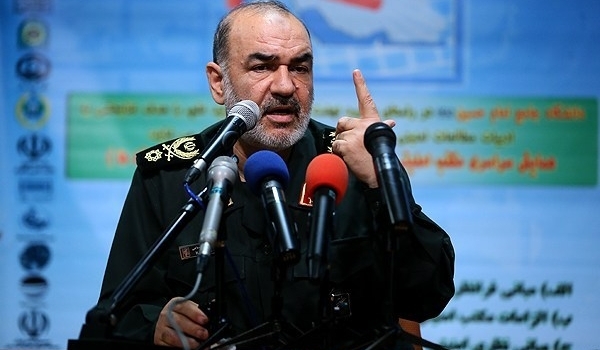Islamic Revolutionary Guards Corps (IRGC) deputy chief Brigadier General Hossein Salami called on his country’s science-and-technology experts to develop a radar-evading device for locally-produced missiles.
By: Ruthie Blum/The Algemeiner
A top Iranian military commander called on his country’s science-and-technology experts to develop a radar-evading device for locally-produced missiles, the Tehran regime’s semi-official news agency Fars reported on Tuesday.
According to the report, Islamic Revolutionary Guards Corps (IRGC) deputy chief Brigadier General Hossein Salami made this demand while attending the inauguration of a nanotechnology center at Imam Hossein University in the Iranian capital.
“One of the tasks at this center is studying the weaponry systems’ electromagnetic properties,” he noted, referring to what is required for radar-evasion. In addition, Salami said, “Production of compounds and composites to decrease the volume and surface of aerospace equipment and ground-based weapons are among the other measures to be adopted.”
Salami’s statements echoed those made nearly two years ago by Defense Minister Brigadier General Hossein Dehghan, who announced that Iran was working on plans to develop radar-evading missiles.
“Iran ranks fourth among the world missile powers after the US, Russia and China,” Dehqan said at the time, claiming that Iran had increased the range of its missiles, but was then trying to increase their precision, endurance and undetectability by enemies — a term Iranian officials have used to describe Sunni Arab states, Israel, Europe and the United States.
Iranian state television broadcast live images of Russian-made, highly-advanced S-300 surface-to-air missiles being transported by trucks to the Fordo nuclear facility south of Tehran. This has led to questions over the true purpose of the site, which Iran has argued was designed for peaceful “civilian” use. During the weapons delivery, Supreme Leader Ayatollah Ali Khamenei said in a speech, “Continued opposition and hype on the S-300 or the Fordo site are examples of the viciousness of the enemy. The S-300 system is a defense system, not an assault one, but the Americans did their best for Iran not to get hold of it.”
Meanwhile, one of Khamenei’s top advisers declared in September that Tehran’s backing of “resistance groups” — the name the Islamic Republic uses to describe terrorist organizations it supports, such as Hamas in Gaza and Hezbollah in Lebanon — will remain steadfast.
